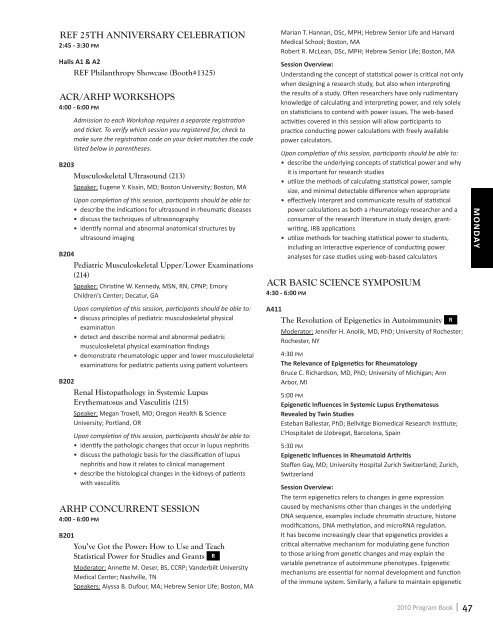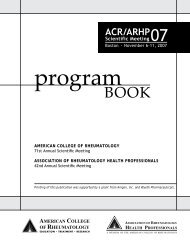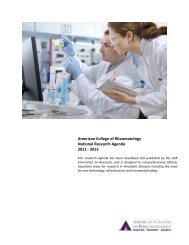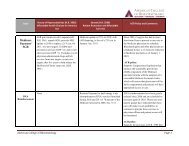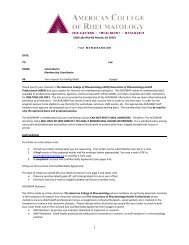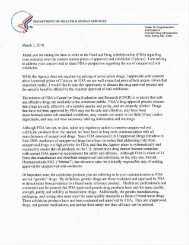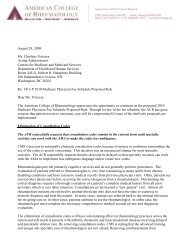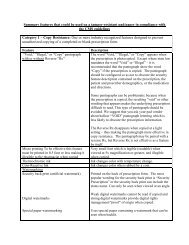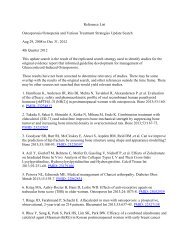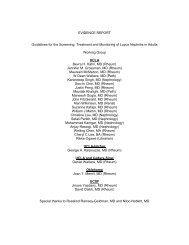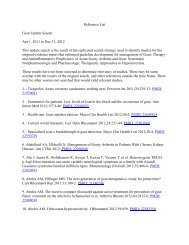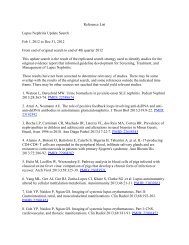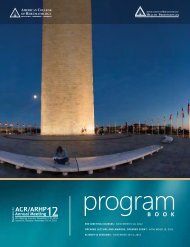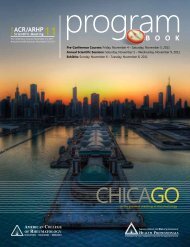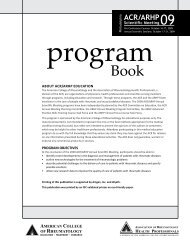B O O K - American College of Rheumatology
B O O K - American College of Rheumatology
B O O K - American College of Rheumatology
Create successful ePaper yourself
Turn your PDF publications into a flip-book with our unique Google optimized e-Paper software.
REF 25th Anniversary Celebration<br />
2:45 - 3:30 PM<br />
Halls A1 & A2<br />
REF Philanthropy Showcase (Booth#1325)<br />
ACR/ARHP Workshops<br />
4:00 - 6:00 PM<br />
Admission to each Workshop requires a separate registration<br />
and ticket. To verify which session you registered for, check to<br />
make sure the registration code on your ticket matches the code<br />
listed below in parentheses.<br />
B203<br />
Musculoskeletal Ultrasound (213)<br />
Speaker: Eugene Y. Kissin, MD; Boston University; Boston, MA<br />
Upon completion <strong>of</strong> this session, participants should be able to:<br />
• describe the indications for ultrasound in rheumatic diseases<br />
• discuss the techniques <strong>of</strong> ultrasonography<br />
• identify normal and abnormal anatomical structures by<br />
ultrasound imaging<br />
B204<br />
Pediatric Musculoskeletal Upper/Lower Examinations<br />
(214)<br />
Speaker: Christine W. Kennedy, MSN, RN, CPNP; Emory<br />
Children’s Center; Decatur, GA<br />
Upon completion <strong>of</strong> this session, participants should be able to:<br />
• discuss principles <strong>of</strong> pediatric musculoskeletal physical<br />
examination<br />
• detect and describe normal and abnormal pediatric<br />
musculoskeletal physical examination findings<br />
• demonstrate rheumatologic upper and lower musculoskeletal<br />
examinations for pediatric patients using patient volunteers<br />
B202<br />
Renal Histopathology in Systemic Lupus<br />
Erythematosus and Vasculitis (215)<br />
Speaker: Megan Troxell, MD; Oregon Health & Science<br />
University; Portland, OR<br />
Upon completion <strong>of</strong> this session, participants should be able to:<br />
• identify the pathologic changes that occur in lupus nephritis<br />
• discuss the pathologic basis for the classification <strong>of</strong> lupus<br />
nephritis and how it relates to clinical management<br />
• describe the histological changes in the kidneys <strong>of</strong> patients<br />
with vasculitis<br />
ARHP Concurrent Session<br />
4:00 - 6:00 PM<br />
B201<br />
You’ve Got the Power: How to Use and Teach<br />
Statistical Power for Studies and Grants R<br />
Moderator: Annette M. Oeser, BS, CCRP; Vanderbilt University<br />
Medical Center; Nashville, TN<br />
Speakers: Alyssa B. Dufour, MA; Hebrew Senior Life; Boston, MA<br />
Marian T. Hannan, DSc, MPH; Hebrew Senior Life and Harvard<br />
Medical School; Boston, MA<br />
Robert R. McLean, DSc, MPH; Hebrew Senior Life; Boston, MA<br />
Session Overview:<br />
Understanding the concept <strong>of</strong> statistical power is critical not only<br />
when designing a research study, but also when interpreting<br />
the results <strong>of</strong> a study. Often researchers have only rudimentary<br />
knowledge <strong>of</strong> calculating and interpreting power, and rely solely<br />
on statisticians to contend with power issues. The web-based<br />
activities covered in this session will allow participants to<br />
practice conducting power calculations with freely available<br />
power calculators.<br />
Upon completion <strong>of</strong> this session, participants should be able to:<br />
• describe the underlying concepts <strong>of</strong> statistical power and why<br />
it is important for research studies<br />
• utilize the methods <strong>of</strong> calculating statistical power, sample<br />
size, and minimal detectable difference when appropriate<br />
• effectively interpret and communicate results <strong>of</strong> statistical<br />
power calculations as both a rheumatology researcher and a<br />
consumer <strong>of</strong> the research literature in study design, grantwriting,<br />
IRB applications<br />
• utilize methods for teaching statistical power to students,<br />
including an interactive experience <strong>of</strong> conducting power<br />
analyses for case studies using web-based calculators<br />
ACR Basic Science Symposium<br />
4:30 - 6:00 PM<br />
A411<br />
The Revolution <strong>of</strong> Epigenetics in Autoimmunity R<br />
Moderator: Jennifer H. Anolik, MD, PhD; University <strong>of</strong> Rochester;<br />
Rochester, NY<br />
4:30 PM<br />
The Relevance <strong>of</strong> Epigenetics for <strong>Rheumatology</strong><br />
Bruce C. Richardson, MD, PhD; University <strong>of</strong> Michigan; Ann<br />
Arbor, MI<br />
5:00 PM<br />
Epigenetic Influences in Systemic Lupus Erythematosus<br />
Revealed by Twin Studies<br />
Esteban Ballestar, PhD; Bellvitge Biomedical Research Institute;<br />
L’Hospitalet de Llobregat, Barcelona, Spain<br />
5:30 PM<br />
Epigenetic Influences in Rheumatoid Arthritis<br />
Steffen Gay, MD; University Hospital Zurich Switzerland; Zurich,<br />
Switzerland<br />
Session Overview:<br />
The term epigenetics refers to changes in gene expression<br />
caused by mechanisms other than changes in the underlying<br />
DNA sequence, examples include chromatin structure, histone<br />
modifications, DNA methylation, and microRNA regulation.<br />
It has become increasingly clear that epigenetics provides a<br />
critical alternative mechanism for modulating gene function<br />
to those arising from genetic changes and may explain the<br />
variable penetrance <strong>of</strong> autoimmune phenotypes. Epigenetic<br />
mechanisms are essential for normal development and function<br />
<strong>of</strong> the immune system. Similarly, a failure to maintain epigenetic<br />
monday<br />
2010 Program Book 47


